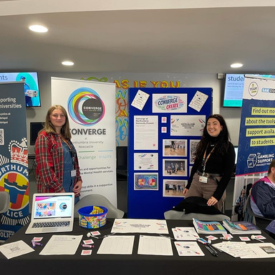-
Study
Study
Interested in studying at Northumbria? With 31,500 students, Northumbria is one of the largest universities in the country, offering courses on either a full-time, part-time or distance learning basis.
Discover more-
Undergraduate
- Undergraduate Study Degree
- Undergraduate Open Day & Events
- Application Guides
- Northumbria University UCAS Exhibitions
- Foundation Years
- Undergraduate Fees & Funding
- School & College Outreach
- Continuing Professional Development
-
Postgraduate
- Postgraduate Study Degree
- Postgraduate Research Degrees
- Postgraduate Open Days and Events
- Postgraduate Fees & Funding
- Flexible Learning
- Thinking about a Masters?
- Continuing Professional Development
- Change Direction
-
Student Life
- The Hub - Student Blog
- Accommodation
- Life in Newcastle
- Support for Students
- Careers
- Information for Parents
- Students' Union
- Northumbria Sport
-
-
International
International
Northumbria’s global footprint touches every continent across the world, through our global partnerships across 17 institutions in 10 countries, to our 277,000 strong alumni community and 150 recruitment partners – we prepare our students for the challenges of tomorrow. Discover more about how to join Northumbria’s global family or our partnerships.
Discover more-
Applying to Northumbria
- European Union
- Our London Campus
- Northumbria Pathway
- International Events
- Entry Requirements
- Agent Network
-
Northumbria Language Centre
- Faculty Requirements
- Acceptable English Requirements
- Pre-Sessional English and Study Skills
- Academic Language Skills Programmes (ALS)
-
International Fees, Funding & Scholarships
- International Undergraduate Fees
- International Undergraduate Funding
- International Masters Fees
- International Masters Funding
- International Postgraduate Research Fees
- International Postgraduate Research Funding
- International Money Matters
-
Life at Northumbria
- International student support
- The Hub - Student Blog
- Careers
-
International Mobility
- Current Northumbria Students
- Incoming Exchange Students
-
-
Business
Business
The world is changing faster than ever before. The future is there to be won by organisations who find ways to turn today's possibilities into tomorrows competitive edge. In a connected world, collaboration can be the key to success.
Discover more -
Research
Research
Northumbria is a research-rich, business-focused, professional university with a global reputation for academic quality. We conduct ground-breaking research that is responsive to the science & technology, health & well being, economic and social and arts & cultural needs for the communities
Discover more -
About Us
-
About Northumbria
- Our Strategy
- Our Staff
- Our Partners
- Student Profiles
- Alumni Profiles
- Leadership & Governance
- Academic Departments
- University Services
- History of Northumbria
- Contact us
- Online Shop
-
-
Alumni
Alumni
Northumbria University is renowned for the calibre of its business-ready graduates. Our alumni network has over 236,000 graduates based in 178 countries worldwide in a range of sectors, our alumni are making a real impact on the world.
Discover more - Work For Us
What will I learn on this module?
This is a 15 EC (30 UK credits) module delivered in the first semester of the MSc Global Sustainable Business Management. It is developed for those of you who have varying business and management subject experience and reflect some of the 17 Sustainable Development Goals of the United Nations (UN)*. The aim of the module is to evaluate sustainable business models by utilising five streams: (i) Responsible Strategy, (ii) Sustainable Marketing, (iii) Socially Responsible Finance, (iv) Corporate Governance and (v) Sustainable Operations. During your learning journey you will evaluate how each of the five streams contributes to the sustainable competitive advantage of a company in a responsible and sustainable way and hence enable the firm to achieve its multi-faceted strategic objectives.
A capstone activity within your learning is the away day ‘Strategy for a Sustainable Future’ offered by the Digital Society School (part of AUAS). In this workshop you’ll learn which skills and knowledge you need to develop as an individual and future manager in order to make a difference taking inspiration by the UN SDGs.
The content of the module comprises five key parts listed below.
Responsible Strategy
SDGs and Business Strategy; Theory of Competitive Advantage in a Sustainable Context; Sustainable Strategic Capabilities; Innovation and Sustainability; Value Creation; Social Entrepreneurship; Triple Bottom Line and Stakeholder Management; Corporate Social Responsibility. (SDGs 8, 9, 11, 12, 17).
Sustainable Marketing
Marketing Planning; Sustainable Marketing and Consumer Behaviour; Multichannel Management and Sustainable Customer Journey; Sustainable Marketing Promotion and Communication. (SDGs 8, 9, 11, 12).
Socially Responsible Finance
Sustainable Financial Investment; Corporate Reporting; SRI and Ethical Tests; Social and Ethical Dimension of Corporate Sustainability. (SDGs 1, 5, 8, 9, 13, 14, 15).
Corporate Governance
Global Business Governance Issues; Principles of Good Governance; The Role and Contest of Board of Directors; Accountability and Alignment of Interest; Local Corporate Government systems. (SDGs 8, 10, 16).
Sustainable Operations
Operations Strategy; Responsible Supply Chains, Lean, Agile and Resilient Supply Chains; Wicked’ problems: Climate Change; Carbon Footprinting; Green Manufacturing. (SDGs 7, 8, 11, 12, 13).
* For information on the sustainable development goals see https://www.un.org/sustainabledevelopment/sustainable-development-goals/
How will I learn on this module?
Critical reflection on knowledge, experience and practice underpins the learning and teaching philosophy along with the explicit development of competence. This is key to your learning on the module. To put this in place, the module comprises of lectures and seminars covering responsible business models and the role of SDGs in key business functions. We will aim to evaluate how SDGs can act as a vehicle for organisations to develop competitive advantage in an increasingly turbulent and dynamic business environment. We will engage with the relevant business theory and reflect on business practice and responsible decision making.
A teaching and learning plan supports the module, outlining the formal sessions, together with the tutor-directed study and independent reading. An interactive approach to lecture sessions will draw upon the directed learning undertaken and your own experiences. Throughout, the emphasis will be on high levels of your participation, both individually and within small groups or teams. You can therefore expect embedding of reflective-practitioner approach to learning in all workshop/seminar sessions through undertaking activities that facilitate you to apply theory to 'real-life' situations, critically analysing and making recommendations for appropriate ways forward for the organisation/individual.
Directed learning will centre upon a range of activities including pre-reading, preparation for interactive activities and use of the discussion board on the e-learning platform. Independent learning will centre upon you identifying and pursuing areas of interest in relation to the subject area or by providing deeper/broader knowledge and understanding of the subject through a range of learning activities that might include extended reading, reflection, research etc.
The away day ‘Strategy for a Sustainable Future’ offered by the Digital Society School (part of AUAS) will aim will to investigate together with representatives of leading design schools what knowledge, expertise and skills strategists need to develop in order to be able to address the UN SDGs.
How will I be supported academically on this module?
A member of academic staff leading the module and a set of subject experts leading the lecture inputs on the five streams of the module provide significant module support. The electronic Learning Portal (eLp) will house lecture and seminar materials relating to the module supported. You will be provided with a wide-ranging electronic reading list that comprises of various journal papers, conference papers and textbooks that cover sustainable strategies and business models for organisations. Module assessment comprises of a component within each stream and an overall assessment which captures your learning across the module.
What will I be expected to read on this module?
All modules at Northumbria include a range of reading materials that students are expected to engage with. The reading list for this module can be found at: http://readinglists.northumbria.ac.uk
(Reading List service online guide for academic staff this containing contact details for the Reading List team – http://library.northumbria.ac.uk/readinglists)
What will I be expected to achieve?
N/A
How will I be assessed?
Students in this module are assessed formatively and summatively. Formative assessment takes place in-class while students work individually or in learning sets on tutor-led tasks. Students will receive feedback by their tutor in -class.
The assessment of the modules aims to capture the strategic thinking, theoretical knowledge and critical thinking of the students.
The module is summatively assessed aiming to evaluate students against the module learning outcomes. Students will be assessed by two components:
Assessment A: Business plan group report, 4000 words (30% of the total module mark).
Assessment A is based on the away day Strategy for a Sustainable Future’. Students will work in groups and submit a business plan report aimed at showcasing a sustainable business.
Assessment B: Individual assignment, 3000 words (70% of the total module mark)
Assessment B is a research-based assignment. Students will work individually.
Students will receive timely and constructive feedback in line with the University policy.
Pre-requisite(s)
N/A
Co-requisite(s)
N/A
Module abstract
You will learn about responsible business and the role of the sustainable business functions and governance within the context of the 17 Sustainable Development Goals of the United Nations. In addition, you will gain an understanding of the overarching principles of setting and executing a sustainable organisational strategy. Within the setting of these strategic objectives, you will understand how the associated responsible decision making will impact on both internal and external stakeholders, and by doing so, will gain an understanding of the concept of responsible decision making and governance as well as being able to assess risk, evaluate innovation and measure company performance.
Course info
Credits 30
Level of Study Postgraduate
Mode of Study 18 months Full-Time
Department Newcastle Business School
Location Netherlands
City Amsterdam
Start September 2024
All information is accurate at the time of sharing.
Full time Courses are primarily delivered via on-campus face to face learning but could include elements of online learning. Most courses run as planned and as promoted on our website and via our marketing materials, but if there are any substantial changes (as determined by the Competition and Markets Authority) to a course or there is the potential that course may be withdrawn, we will notify all affected applicants as soon as possible with advice and guidance regarding their options. It is also important to be aware that optional modules listed on course pages may be subject to change depending on uptake numbers each year.
Contact time is subject to increase or decrease in line with possible restrictions imposed by the government or the University in the interest of maintaining the health and safety and wellbeing of students, staff, and visitors if this is deemed necessary in future.
Your Learning Experience
Find out about our distinctive approach at
www.northumbria.ac.uk/exp
Admissions Terms and Conditions
northumbria.ac.uk/terms
Fees and Funding
northumbria.ac.uk/fees
Admissions Policy
northumbria.ac.uk/adpolicy
Admissions Complaints Policy
northumbria.ac.uk/complaints














